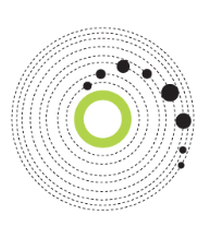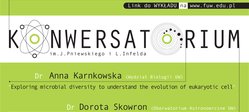
Konwersatorium im. Jerzego Pniewskiego i Leopolda Infelda Wydziału Fizyki UW
dr Anna Karnkowska, Exploring microbial diversity to understand the evolution of eukaryotic cell
dr Dorota Skowron, A three-dimensional map of the Milky Way based on classical Cepheids
21 grudnia 2020 16:30
on-line
Najbliższe Konwersatorium im. Jerzego Pniewskiego i Leopolda Infelda Wydziału Fizyki UW odbędzie się w poniedziałek, 21 GRUDNIA, o godz. 16.30. Tym razem wysłuchamy wykładów laureatek (ex aequo) nagrody im. prof. Stefana Pieńkowskiego, którymi w tym roku zostały:
- dr Anna Karnkowska (Wydział Biologii UW), "Exploring microbial diversity to understand the evolution of eukaryotic cell"
- dr Dorota Skowron (Obserwatorium Astronomiczne UW), "A three-dimensional map of the Milky Way based on classical Cepheids"
Nagroda im. prof. Stefana Pieńkowskiego została ustanowiona w 2004 r. dla upamiętnienia Profesora Stefana Pieńkowskiego, jako twórcy warszawskiego ośrodka fizyki. Inicjatorem i głównym fundatorem nagrody jest dr Marek Maria Pieńkowski, działający za pośrednictwem Fundacji Marka Marii Pieńkowskiego. Współfundatorem nagrody jest Fundacja Kościuszkowska. Nagrodę przyznaje Kapituła, której przewodniczącym jest dyrektor Instytutu Fizyki Doświadczalnej Wydziału Fizyki Uniwersytetu Warszawskiego.
Zapraszamy do dołączenia do spotkania 15-30 minut przed rozpoczęciem wykładu, by porozmawiać lub "poczatować" w nieformalnej atmosferze.
Link: https://us02web.zoom.us/j/93881687598?pwd=UmFhVUdVSXhnQ2tIVVozNmowSUNtZz09
Numer spotkania: 938 8168 7598
Kod dostępu: prv316
Pozdrawiamy,
Barbara Badełek
Jan Chwedeńczuk
Jan Kalinowski
Jan Suffczyński
dr Anna Karnkowska (Wydział Biologii UW)
"Exploring microbial diversity to understand the evolution of eukaryotic cell"
The emergence of eukaryotes, cells with organelles such as nucleus and mitochondria
or plastids, had a revolutionary impact on the subsequent history of life, leading
to the evolution of complex multicellular organisms. I will discuss the endosymbiotic
origin of mitochondria and plastids from bacteria, and their subsequent evolution.
Finally, I will focus on our discovery of a unicellular organism Monocercomonoides,
the first known eukaryote with no mitochondrion. Investigation of Monocercomonoides
allowed us to understand how endosymbiosis can be undone and how this affects the
cellular complexity.
dr Dorota Skowron (Obserwatorium Astronomiczne UW)
"A three-dimensional map of the Milky Way based on classical Cepheids"
We know that the Milky Way is a spiral galaxy, but methods used to describe it in more
detail have been indirect and based on various assumptions. This, combined with the fact
that we live within the disk and observe it through clouds of gas and dust, makes it
very difficult to make a precise map of our Galaxy. However, there is a class of young
variable supergiant stars, called classical Cepheids, to which we can measure distances
with great accuracy. I will show how we used a large sample of these stars to create
a new, detailed map of the Milky Way in three dimensions, and what they can tell us
about the recent history of our Galaxy.

